|
|
|
Sort Order |
|
|
|
Items / Page
|
|
|
|
|
|
|
| Srl | Item |
| 1 |
ID:
140117
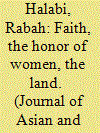

|
|
|
|
|
| Summary/Abstract |
This study investigates the status of the Druze women in Israel, focusing on the effects of the frequent interactions between the Druze and the more permissive Jewish-Western society. The main question posed is why Druze women accept the double standards of freedom, especially on sexual morality, that expect them to be chaste but allow sexual freedom to men. I argue that this is a patriarchal deal, in which women trade their sexual freedom in exchange for access to higher education, and to the prestigious status of moral guardians from western temptations. The paper is based on narrative analysis of in-depth interviews conducted with 50 Druze students, half of them male and half female, enrolled in Israeli universities.
|
|
|
|
|
|
|
|
|
|
|
|
|
|
|
|
| 2 |
ID:
140120
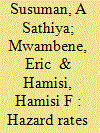

|
|
|
|
|
| Summary/Abstract |
Tanzania’s child mortality rate—between 103 and 130 deaths per 1000 live births–is well above the world average. The data from the Tanzania HIV/AIDS and Malaria Indicator Survey 2007/08 were used in order. There were 27,511 children included in the analysis. Regression analysis focused on child mortality based on maternal and fertility behaviours. Children belonging to the group of higher birth order faced 0.17 odds of dying. A birth spacing of 24 months or longer was observed in the successive birth interval for 76% of the respondents. Focusing on the study’s findings, encouraging longer breastfeeding practice is one way to help produce a healthy baby.
|
|
|
|
|
|
|
|
|
|
|
|
|
|
|
|
| 3 |
ID:
140119
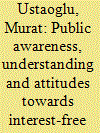

|
|
|
|
|
| Summary/Abstract |
Islamic scholars raise different opinions and views on modern insurance practices. Some hold that private insurance services and instruments serve as assurances that are allowed under Islamic law, whereas some others oppose this view arguing that there are serious doubts on their compatibility with Islam. Islam does not allow interest-based approaches and practices in the economic field; for this reason some Muslims are cautious vis-à-vis insurance services. Reactions by scholars to the insurance practices and implementation do not eliminate the needs of Muslims who want to regulate their daily lives by the Islamic tenets. Those who hold that conventional insurance practices are not compatible with Islam stress that there could be an alternative to this practice that would also be compatible with Islamic law. There are some versions of the companies created to address such concerns in Iran and Malaysia. Such institutions are pretty rare in countries such as Turkey, where Islamic finance receives little attention. For this reason, the study analyses the Takaful practices in Turkey and measures public awareness on this new practice. The results of the survey are tested empirically and some insights are offered accordingly.
|
|
|
|
|
|
|
|
|
|
|
|
|
|
|
|
| 4 |
ID:
140121
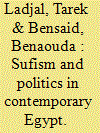

|
|
|
|
|
| Summary/Abstract |
Experts on Sufi movements relegate a rather significant and critical role for Sufism in the formation of redefined political forces on the new post-Arab Spring political map. This is particularly true for one of the most vibrant Sufi capitals of the Muslim world, Egypt, holding a record sum of more than 10 million Sufi members. In spite of this, however, one year after the Revolution in Egypt, political developments exhibited a pattern of failure of Sufis gaining political ground in the post-Mubarak political arena. This paper discusses contentions and problematic issues Sufis faced with respect to politics in Egypt, with particular focus given to their political experience in Egypt. This study seeks to explore the Sufi experience throughout the process of political struggle, while examining their contributions to the November 2011 elections in an attempt to unveil the factors culminating in their political setback in spite of their massive membership base, and the official favored support of the state, both on the local and international fronts. The study concludes that the nature of the Sufi practice itself contributed to a restraining of their political presence, in addition to their lack of political awareness, poor organization and populism, all of which acted critically toward creating a failed political journey for the Sufi orders in modern Egypt.
|
|
|
|
|
|
|
|
|
|
|
|
|
|
|
|
| 5 |
ID:
140115
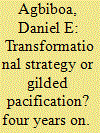

|
|
|
|
|
| Summary/Abstract |
My central aim in this paper is to evaluate the outcomes of the amnesty programme established in mid-2009 by the Nigerian government as a way of resolving the groundswell of violence in the oil-rich Niger Delta region. In particular, I focus analytic attention on the planning and implementation of the Disarmament, Demobilisation and Reintegration (DDR) process of the amnesty. I argue that while the amnesty promotes non-killing alternatives to conflict resolution and opens a door for stabilisation, its current planning and implementation is flawed and unable to reduce the long-term potential for armed conflict in the Niger Delta. Far from been a transformational strategy, I argue that the amnesty programme has become a strategy of gilded pacification essentially targeted at buying off militants and re-establishing oil and gas production in the Niger Delta without addressing the multilayered causes of peacelessness in the region.
|
|
|
|
|
|
|
|
|
|
|
|
|
|
|
|
| 6 |
ID:
140116
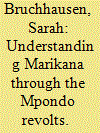

|
|
|
|
|
| Summary/Abstract |
The purpose of this article is to demonstrate some of the ways in which rural histories can enhance our understanding of both rural and urban resistance, both past and present, in contemporary South Africa. In order to do so, it explores two books in conversation with each other, Thembela Kepe and Lungisile Ntsebeza’s edited volume Rural Resistance in South Africa: The Mpondo Revolts after Fifty Years as well as Peter Alexander, Thapelo Lekgowa, Botsang Mmope, Luke Sinwell and Bongani Xezwi’s Marikana: A View from the Mountain and a Case to Answer. These two books provide a useful platform from which to engage in a re-examination of rurally based protest and repression in order to locate some of the suggestive links, particularly in regard to the transmission of repertoires of struggle, between the Marikana strike and the Mpondo revolts, as well as the on-going struggles of the organised poor in some of South Africa’s urban centres.
|
|
|
|
|
|
|
|
|
|
|
|
|
|
|
|
|
|
|
|
|